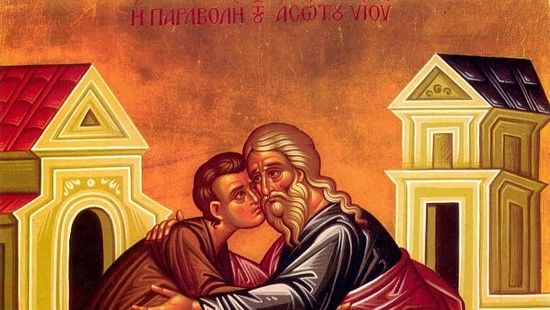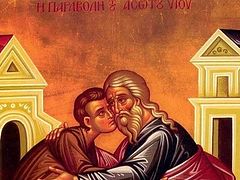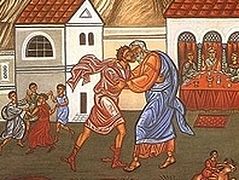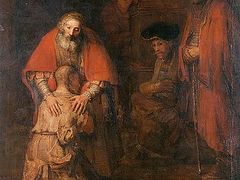Source: Orthodox Christian Network
February 25, 2016
But while he was yet at a distance, his father saw him and had compassion, and ran and embraced him and kissed him. And the son said to him, “Father I have sinned against heaven and before you; I am no longer worthy to be called your son.” But the Father said to his servants, “Bring quickly the best robe, and put it on him; and put a ring on his hand, and shoes on his feet; and bring the fatted calf and kill it, and let us eat and make merry; for this my son was dead, and is alive again; he was lost and is found. Luke 15: 20-24 (Gospel on the Sunday of the Prodigal Son)
Today’s reflection focuses on the father, in the story of the Prodigal Son. How sad the father must have been to have his younger son, his baby, ask for his inheritance. How sad the father must have been to see his younger son walk away from his home. I imagine the father sitting on his porch, head in his hands, crying for his son. I imagine him looking down the long road wondering if he will ever see his son coming back bounding toward the house.
Yet the father didn’t stop the son. He didn’t take away his freedom. He didn’t send a search party after him. He waited and he hoped that his son would come back to him.
And then one day, the son appeared. He must have been dirty and haggard—he had no money, no place to lay his head, probably hadn’t had a shower. Here the boy had left rich and excited and was returning penniless and Not only had the son brought shame on himself, he had also shamed his father.
If you pay close attention to this story, you will find a most wonderful detail that is very important and often overlooked. We know that the son was returning home with a plan, to ask his father’s forgiveness and to beg to be treated as a servant. But, we are told, that while the son was still a distance away from the house, that the father saw him and was filled with compassion, that he ran towards his wayward son and embraced him and kissed him. His first reaction was one of joy, not anger. He didn’t demand to know what had happened. He didn’t demand repayment on the inheritance. He embraced him and kissed him.
As I imagine this parable in my mind, I imagine that the son almost had to pry his father off of him and say “wait, I have something to say—I have sinned against heaven and before you and I am no longer worthy to be called your son, treat me as a hired servant.” And it’s as if the father wouldn’t even hear what his son is saying. He didn’t tell his son that he is disappointed, or put the son on probation. He certainly didn’t treat him as a servant. He ordered a robe to be brought, a ring to be put on his finger and shoes on his feet and for a feast to be thrown in his honor. He was so happy that his son came back. The son’s apology was sincere, no doubt, but the father’s joy is what ruled the day.
I can’t tell you how many times I have thought about this parable when I hear a confession. It’s not that the sins people confess are not relevant, because they most certainly are. But as a priest, hearing the sins and the pains of the people, my first reaction when someone comes to confession is always one of joy, that one of God’s children has come back. I try to remember the father of the Prodigal Son, and to share his joy that his child who was lost has now been found.
And this image, of the kind and forgiving father is the image we should all have of our Lord. He waits for us to make our way back. He waits to embrace us and welcome us home. Our burden is to make the journey. We don’t have to wonder what His reaction will be. It will be one of great joy. Jesus tells us that “there will be more joy in heaven over one sinner who repents than over ninety-nine righteous person who need no repentance” (Luke 15:7). It took courage for the son to make the journey back, not knowing how it would end for him. For us, we need merely effort to make the journey back. We know how it will end. Our Heavenly Father will embrace us and forgive us. All we have to do is come back.
The theme of Great Lent is the Prodigal Son, and making our way back to the Father. Why is there such joy on Pascha? Because we celebrate not only Christ’s Resurrection but we celebrate all those who have made it back to God. As we prepare for Lent in this period of the Triodion, our job today is to think on how we’ve missed the mark. The journey of Lent is the journey back to God the Father. And Pascha is the celebration, when everything begins anew in the Light of the Resurrected Christ for all of God’s children who have made the journey back. When we come to the Lord in repentance, when we ask for forgiveness and seek to be His servants, this is when He restores us as His sons and daughters. It takes humility to realize you’ve missed the mark. It takes repentance to make the journey back. Humility and repentance lead to forgiveness and restoration. And these are what lead to true joy.
Like the Prodigal Son, I too, have come, O compassionate one; I have spent my whole life in a foreign land; I have squandered the wealth that You have given me, O Father. Receive me as I repent, O God, and have mercy on me. (From the Praises of Orthros on the Sunday of the Prodigal Son)
Identify at least one way in which you are “missing the mark” and start mapping out a way to “come back.”




